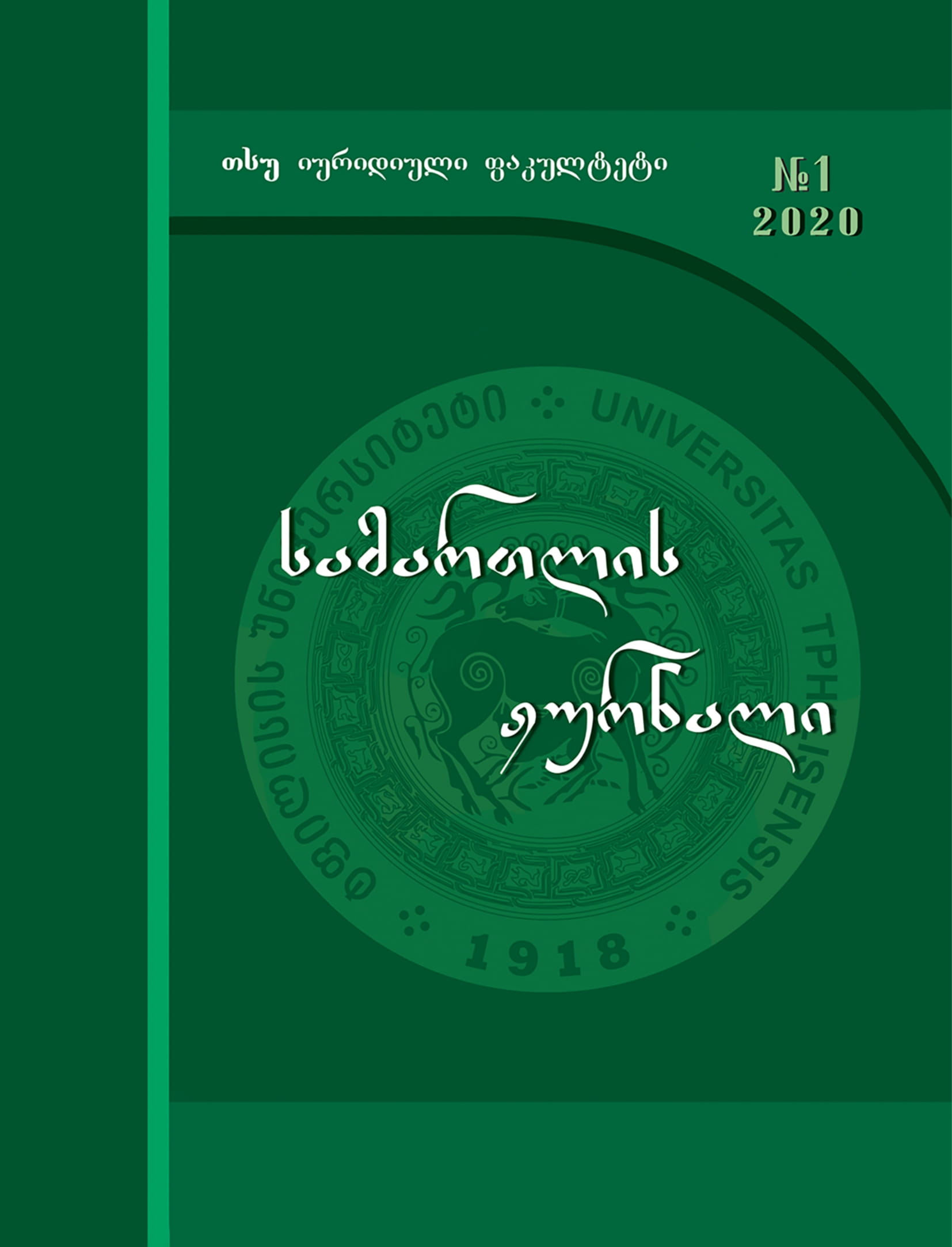„ნომინალიზმის პრინციპის“ მნიშვნელობა ფულადი ვალდებულების შესრულებისას
საკვანძო სიტყვები:
ფულადი ვალდებულებები; “ნომინალიზმის” პრინციპი; საქართველოს სამოქალაქო კოდექსის (სსკ-ი) 389-ე მუხლი.ანოტაცია
ფულადია ისეთი ვალდებულება[1], რომლის ობიექტია განსაზღვრული ოდენობის ფულადი თანხის გადახდა.[2] დამკვიდრებული შეხედულების თანახმად, ფული, როგორც ეკონომიკური კატეგორია და სამოქალაქო ბრუნვის ობიექტი, საზოგადოებრივ ურთიერთობებში გარკვეული ფუნქციების შემსრულებლად გვევლინება. ფულის ცნება ეს არის არამარტო ეკონომიკური ცხოვრების, არამედ ასევე იურიდიული სამყაროს ნაწილი[3]. ფულის ფუნქცია როგორც კერძო, ასევე საჯარო სამართლებრივ ურთიერთობებში იდენტურია და თავის თავში მოიცავს ღირებულების/ფასეულობის შეფასების, გადაცემის, დაგროვების უნივერსალურ შესაძლებლობას, აგრეთვე წარმოადგენს ანგარიშსწორების ერთეულს.
ნაშრომში დოქტრინისა და სასამართლო პრაქტიკის ანალიზის საფუძველზე განხილულია არა ზოგადად ფულადი ვალდებულების შესრულების თავისებურებანი, არამედ სსკ-ის 389-ე მუხლით გათვალისწინებული ე.წ. „ნომინალიზმის” პრინციპის სამართლებრივი ბუნება. ნორმის მიზანი საბაზრო ეკონომიკის განვითარების ხელშეწყობა და სამოქალაქო ბრუნვის სტაბილურობის უზრუნველყოფაა.[4]
[1] Donnelly M., The Law of Banks and Credit Institutions, Dublin, 2000, 369.
[2] Weiler F., Schuldrecht AT, Baden-Baden, Nomos, 2012, § 9, Rn 2.
[3] Mann F. A., The Legal Aspect of Money with Special Reference to Comparative Private and Public International Law, 5th ed., Oxford, 1992, 3.
[4] მესხიშვილი ქ., კერძო სამართლის აქტუალური საკითხები, ტომი I, GIZ, თბ., 2020, 128.
წყაროები
Civil Code of Georgia, Parliamentary Gazette, 31, 26/06/1997.
Asatiani R., Money and Monetary Systems, Tbilisi, 1996, 31, 32 (in Georgian).
Atamer Y. M., in: Kröll St., Mistelis L., Viscasillas P. P., UN-Convention on the International Sales of Goods (CISG).
Beale H. G., Principles of European Contract Law, Lando O. (ed.), Parts I-II, Kluwer Law International, The Hague, London, Boston, 2000, 374.
Chachava S., Competition of Claim and Grounds for Claim in Private Law, Doctoral Thesis, TSU, Tbilisi, 2010, 72 (in Georgian).
Chantladze M., Definition of the Declaration of Will, Reduction of Forfeit, Principle of Nominalism, Journal “Georgia law Review”, № 1, 2002, 172-174 (in Georgian).
Chanturia L., Credit Security Law, Tbilisi, 2012, 7 (in Georgian).
Chanturia L., General Part of Civil Law, Tbilisi, 2011, 357 (in Georgian).
Chitashvili N., Adjustment of a Contract to Changed Circumstances as a Legal Consequence of Complication of Fulfillment of an Obligation, Law Journal, № 1, 2014, 204.
Donnelly M., The Law of banks and credit institutions, Dublin, 2000, 369.
Dzlierishvili Z., Tsertsvadze G., Robakidze I., Svanadze G., Tsertsvadze L., Janashia L., Contract Law, Tbilisi, 2014, 248 (in Georgian).
Dzlierishvili Z., Legal Nature of Contracts on Transfer of Property under Ownership, Tbilisi, 2010, 296 (in Georgian).
Dzlierishvili Z., Specificities of Fulfillment of Monetary Obligation, Tbilisi, 2005, 39 (in Georgian).
Eichengreen B., International Monetary Arrangements for the 21st Century, Intergrating National Ecohomies,Washington, 1994, 29.
Feibelman A., Europe and the Future of International Monetary Law, Symposium Issue: The European Sovereign Debt Crisis: A Critical Assessment of the Euro & European Monetary Union, Transnational Law & Contemporary Problems, 22, http://www.lexisnexis.com/hottopics/lnacademic/ [30.03.2020].
Fox D., The Case of Mixt Monies: Confirming Nominalism in the Common Law of Monetary Obligations, Cambridge Law Journal 70(1), March, 2011, 144-174.
Grothe H., in: Bamberger H. G., Roth H., Hau W., Poseck R., BeckOK BGB, 53. Aufl., München, §244, Rn.1-3
Grundmann St., in: MüKo, BeckOK BGB, 8. Aufl., München, 2019, §244, Rn.2.
Gruber G., Geldwertschwankungen und handelsrechtliche Verträge in Deutschland und Frankraich. Bestandsaufnahme und Aussichten für das europäische Währungs und Privatrecht, Berlin, 2002, 41.
Grüneberg Ch., in: Palandt O., BGB Komm., 78 Aufl., München, 2018., § 245, Rn. 2., §293, Rn. 1.
Hofmeister H., Goodbye Euro: Legal Aspects of Withdrawal from the Eurozone, European Legal Studies Center, Columbia University Columbia Journal of European Law, Fall, 2011, http://www.lexisnexis.com/hottopics/lnacademic/ [30.03.2020].
Issing O., Stabiles Geld –eine Illusion? Mohr Siebeck, Tübingen, 2019, 5.
Jansen N., Zimmermann R., Was ist und wozu der DCFR? NJW, 2009, 3401.
Kakulia R., Khelaia G., General Theory of Money Circulation and Credit, Tbilisi, 2003, 18 (in Georgian).
Keynes J. M., Allgemeine Theorie der Beschäftigung, des Zinses und des Geldes, Aus dem Englischen neu übersetz von Nicola Liebert, Buch V, Kapitel 19, Berlin, 2017, 145.
Lorenz St., Bamberger H. G., Roth H., Hau W., Poseck R., BeckOK BGB, 53. Aufl., München, 2020, §313, Rn. 2-3.
Lonzhanidze P., Currency Rate in Monetary Obligations, Journal “Human Being and Constitution”, № 3, 2000, 70 (in Georgian).
Lenihan N., The Legal Implications of the European Monetary Union under U.S and New York Law, 72. http://ec.europa.eu/economy_finance/publications/publication11220_en.pdf [30.03.2020].
Mann F. A., The Legal Aspect of Money With special reference to Comparative Private and Public International Law, 5th Ed., Oxford, 1992, 3.
Meskhishvili K., Topical Issues of Private Law, Vol. I, GIZ, Tbilisi, 2020, 128 (in Georgian).
Meskhishvili K., Online Commentary of the Civil Code of Georgia, Article 389, field 3, www.gccc.ge [30.03.2020] (in Georgian).
Meskhishvili K., Impact of the Change of Currency Rate on Civil Relations, “Georgian Business Law Review”, V Issue, 2016, 7 (in Georgian).
Meskhishvili K., Payment of Interest in the Case of Overdue Payment of Money (Theory and Judicial Practice, “Georgian Business Law Review”, V Issue, 2016, 19 (in Georgian).
Omlor S., Geldprivatrecht Entmaterialisierung, Europäisierung, Entwertung, Mohr Siebeck, Tübingen, 2014, 51.
Schulte-Nölke H., Clive E., von Bar Cr. (eds.), Principles, Definitions and Model Rules of European Private Law: Draft Common Frame of Reference (DCFR), Outline Edition, Münich, 2009.
Smidt-Kessel M., in: Prüting H., Wegen G., Weinreich G., BGB Komm., 14. Aufl., Köln 2019, §244, 369.
Shotadze T., Mortgage as a Security Mean for a Bank Credit, Tbilisi, 2012, 138-142 (in Georgian).
Tskepladze N., Payment of Monetary Obligations in the Case of Change of Currency Unit, “Georgian Law Review”, № 1, 2003, 194 (in Georgian).
Vashakidze G., Civil Code System of Complicated Obligations, Tbilisi, 2010, 98 (in Georgian).
Weiler F., Schuldrecht AT, Baden-Baden, Nomos, 2012, § 9, Rn 2, 8.
Wittreck F., Geld als Instrument der Gerechtigkeit, BRILL, Ferdinand Schöning, 2002, 165 ff., htpp//www. Schöeningh.de/view/title/45057 [30.03.2020].
Zoidze B., Reception of European Private Law in Georgia, Tbilisi, 2005, 268 (in Georgian).
Zoidze B., Chanturua L., Zoidze B., Ninidze T., Khetsuriani J., Shengelia R., (Ed.) Commentary on Georgian Civil Code, Book Three, Tb., 2001, Article 383, 267 (in Georgian).
Ruling of the Civil Chamber of the Supreme Court of Georgia in the Case № AS-1190-2018, dated 12 April, 2019.
Ruling of the Civil Chamber of the Supreme Court of Georgia in the Case № AS-1298-2018, dated 22 March, 2019.
Ruling of the Civil Chamber of the Supreme Court of Georgia in the Case № AS-831-831-2018, dated 22, March 2019.
Ruling of the Civil Chamber of the Supreme Court of Georgia in the Case № AS-1162-2018, dated 08 February, 2019.
Ruling of the Civil Chamber of the Supreme Court of Georgia in the Case № AS-54-54-2018, dated 13 February, 2018.
Ruling of the Civil Chamber of the Supreme Court of Georgia in the Case № AS-1269-1189-2017, dated 15 December, 2017.
Ruling of the Civil Chamber of the Supreme Court of Georgia in the Case № AS-130-122-2017, dated 24 March, 2017.
Ruling of the Civil Chamber of the Supreme Court of Georgia in the Case № AS-762-730-2016, dated 16 January, 2017.
Ruling of the Civil Chamber of the Supreme Court of Georgia in the Case № AS-217-207-2016, dated 20 May, 2016.
Ruling of the Civil Chamber of the Supreme Court of Georgia in the Case № AS-147-143-2016, dated 20 May, 2016.
Ruling of the Civil Chamber of the Supreme Court of Georgia in the Case № AS-501-475-2015, dated 31 March 2016.
Ruling of the Civil Chamber of the Supreme Court of Georgia in the Case № AS-1512-1427-2012, dated 01 December, 2014.
Ruling of the Civil Chamber of the Supreme Court of Georgia in the Case № AS-1153-1173-2011, dated 31 October 2011.
Ruling of the Civil Chamber of the Supreme Court of Georgia in the Case № AS-1096-1125-2011, dated 06 October, 2011.
Ruling of the Civil Chamber of the Supreme Court of Georgia in the Case № AS-347-323-2010, dated 19 July, 2010.
Ruling of the Civil Chamber of the Supreme Court of Georgia in the Case № AS-239-564-2009, dated 17 September, 2009.
Ruling of the Civil Chamber of the Supreme Court of Georgia in the Case № AS-870-1138-2005, dated 09 March, 2006.
www.duncker-humblot.de [30.03.2020].
www.mohr.de [30.03.2020].
ჩამოტვირთვები
გამოქვეყნებული
როგორ უნდა ციტირება
გამოცემა
სექცია
ლიცენზია

ეს ნამუშევარი ლიცენზირებულია Creative Commons Attribution-ShareAlike 4.0 საერთაშორისო ლიცენზიით .








